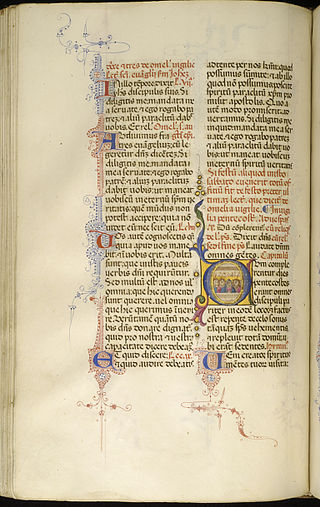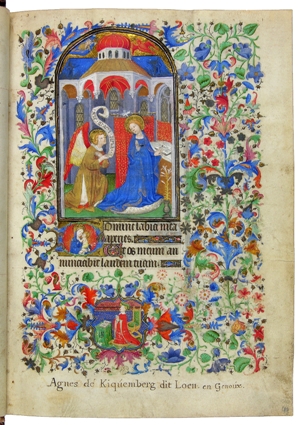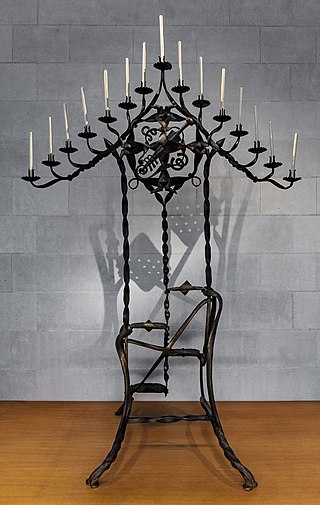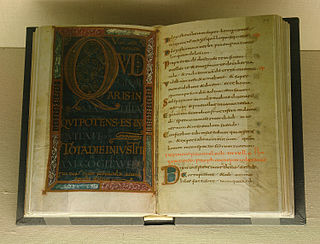Related Research Articles

The Roman Breviary is a breviary of the Roman Rite in the Catholic Church. A liturgical book, it contains public or canonical prayers, hymns, the Psalms, readings, and notations for everyday use, especially by bishops, priests, and deacons in the Divine Office.

Vespers is a liturgy of evening prayer, one of the canonical hours in Catholic, Eastern Orthodox, Oriental Orthodox, and Lutheran liturgies. The word for this fixed prayer time comes from the Latin vesper, meaning "evening".

In the practice of Christianity, canonical hours mark the divisions of the day in terms of fixed times of prayer at regular intervals. A book of hours, chiefly a breviary, normally contains a version of, or selection from, such prayers.
A canticle is a hymn, psalm or other Christian song of praise with lyrics usually taken from biblical or holy texts. Canticles are used in Christian liturgy.
Matins is a canonical hour in Christian liturgy, originally sung during the darkness of early morning.

Lauds is a canonical hour of the Divine office. In the Roman Rite Liturgy of the Hours it is one of the major hours, usually held after Matins, in the early morning hours.

Tenebrae is a religious service of Western Christianity held during the three days preceding Easter Day, and characterized by gradual extinguishing of candles, and by a "strepitus" or "loud noise" taking place in total darkness near the end of the service.

The Liturgy of the Hours or Divine Office or Opus Dei are a set of Catholic prayers comprising the canonical hours, often also referred to as the breviary, of the Latin Church. The Liturgy of the Hours forms the official set of prayers "marking the hours of each day and sanctifying the day with prayer." The term "Liturgy of the Hours" has been retroactively applied to the practices of saying the canonical hours in both the Christian East and West–particularly within the Latin liturgical rites–prior to the Second Vatican Council, and is the official term for the canonical hours promulgated for usage by the Latin Church in 1971. Before 1971, the official form for the Latin Church was the Breviarium Romanum, first published in 1568 with major editions through 1962.

The Office of the Dead or Office for the Dead is a prayer cycle of the Canonical Hours in the Catholic Church, Anglican Church and Lutheran Church, said for the repose of the soul of a decedent. It is the proper reading on All Souls' Day for all departed souls (Purgatory), and can be a votive office on other days when said for a particular decedent. The work is composed of different psalms, scripture, prayers and other parts, divided into The Office of Readings, Lauds, Daytime Prayer, Vespers and Compline.
Prime, or the First Hour, is one of the canonical hours of the Divine Office, said at the first hour of daylight, between the dawn hour of Lauds and the 9 a.m. hour of Terce. It remains part of the Christian liturgies of Eastern Christianity, but suppressed within the Latin liturgical rites by the Second Vatican Council. In the Coptic Church, a denomination of Oriental Orthodox Christianity, the office of Prime is prayed at 6 am in eastward direction of prayer by all members in this denomination, both clergy and laity, being one of the seven fixed prayer times. Latin Catholic clergy under obligation to celebrate the Liturgy of the Hours may still fulfil their obligation by using the edition of the Roman Breviary promulgated by Pope John XXIII in 1962, which contains Prime. Like all the liturgical hours, except the Office of Readings, it consists mainly of Psalms. It is one of the Little Hours.

Nocturns is a Christian canonical hour said in the nighttime.
The Little Office of the Blessed Virgin Mary, also known as Hours of the Virgin, is a liturgical devotion to the Blessed Virgin Mary, in imitation of, and usually in addition to, the Divine Office in the Catholic Church. It is a cycle of psalms, hymns, scripture and other readings.

The Dominican Rite is the unique liturgical rite of the Dominican Order in the Catholic Church. It has been classified differently by different sources – some consider it a usage of the Roman Rite, others a variant of the Gallican Rite, and still others a form of the Roman Rite into which Gallican elements were inserted.
The Benedictine Rite is the particular form of Mass and Liturgy celebrated by the Benedictine Order, as based on the writings of St. Benedict on the topic.
The reform of the Roman Breviary by Pope Pius X was promulgated by that Pope with the apostolic constitution Divino afflatu of 1 November 1911.

The Latin Psalters are the translations of the Book of Psalms into the Latin language. They are the a resource used in the Liturgy of the Hours and other forms of the canonical hours in the Latin liturgical rites of the Catholic Church.
The liturgical books of the Roman Rite are the official books containing the words to be recited and the actions to be performed in the celebration of Catholic liturgy as done in Rome. The Roman Rite of the Latin or Western Church of the Catholic Church is the most widely celebrated of the scores of Catholic liturgical rites. The titles of some of these books contain the adjective "Roman", e.g. the "Roman Missal", to distinguish them from the liturgical books for the other rites of the Church.

Psalm 148 is the 148th psalm of the Book of Psalms, beginning in English in the King James Version: "Praise ye the Lord from the heavens". In Latin, it is known as "Laudate Dominum de caelis". The psalm is one of the Laudate psalms. Old Testament scholars have also classified it as a creation psalm and a wisdom psalm.

Psalm 150 is the 150th and final psalm of the Book of Psalms, beginning in English in the King James Version: "Praise ye the LORD. Praise God in his sanctuary". In Latin, it is known as "Laudate Dominum in sanctis eius". In Psalm 150, the psalmist urges the congregation to praise God with music and dancing, naming nine types of musical instruments.

The Daily Office in Anglican churches focuses the traditional canonical hours on daily services of Morning Prayer and Evening Prayer, usually following the Book of Common Prayer. As in other Christian traditions, either clergy or laity can lead the daily office. Most Anglican clergy are required to pray Morning and Evening Prayer daily.
References
- ↑ The New Liturgical Movement "Compendium of the Reforms of the Roman Breviary, 1568-1961: Part 7.2 - The Breviary Reforms of St. Pius X" . Retrieved 2021-04-06.